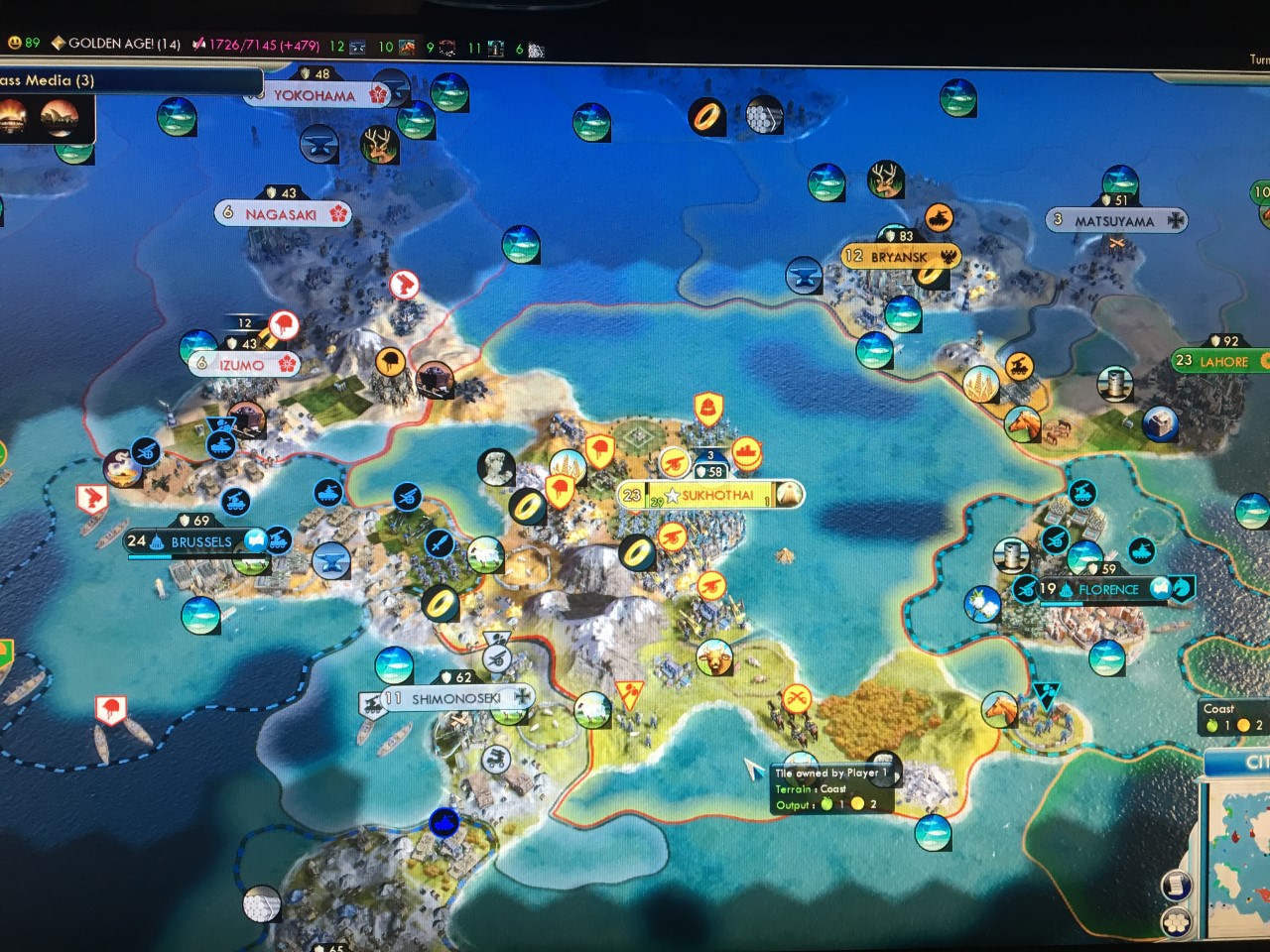I recently had a culture victory with nine cities - though it became very clear to me that it should have been easier with fewer. Is it possible to never found another city, and still be able to gain enough culture points (and enough of a defense) to get a culture victory?
-
1I recently tried this as India on Emperor level. I was doing OK on social policies, but I started falling behind technologically, and was completely incompetent from a military standpoint. Eventually Germany with his army supported by about 40 cities put me out of my misery.– bwarnerCommented Sep 30, 2010 at 21:36
-
Each additional non-puppet city adds a fixed percentage to the base cost for social policies. The percentage varies depending on map size (up to 30% for duel maps).– Larry WangCommented Sep 30, 2010 at 23:29
10 Answers
I got a cultural victory with India with just my capital. I played on a archipelago map on prince where I had a small land mass all to myself until mid-late game. If I were playing on a higher difficulty I would have been worried about defense. I was falling heavily behind on research and the last 75 turns or so was me spamming next turn.
As it was I didn't win until 2032, so I squeaked it in barely.
Edit: I tried previous to this on a continents map and fell so far behind on research that with four other civs on the continent that I was bullied by England, so I restarted on the archipelago map.
-
Love the info in Raven's answer - but this directly answers the question. Thanks!– JeffreyCommented Oct 1, 2010 at 18:27
Because with few exceptions, culture is capped to being produced by cities it is generally not effective (though certainly feasible) to win with only one city. The break even points (in terms of when the potential culture gained by a new city equals the increased cost of social policies) varies depending on tech level, map size, and game speed (And whether you have Cristo Redentor).
An easy way around this is to simply use one city and a strong military to puppet most of your neighbors. They puppet-ed cities will provide the city-based culture without increasing the costs of social policies.
From what I understand, 3-4 owned cities is a good number on most standard maps.(and as many cultural city-states as your coffers can keep happy)
-
3Do you think you could come up with a formula to optimize the correct number of cities is "optimal" for a cultural victory (assuming infinite space).– tzenesCommented Sep 30, 2010 at 19:48
-
1Wait - puppet cities don't count towards the number of cities you have for social policy costs? Is that correct?– ColenCommented Sep 30, 2010 at 20:28
-
2Correct. It mentions this specifically when you're given the option to puppet a city. Commented Sep 30, 2010 at 20:56
-
Good luck creating a strong military with one city. Its hard to do much when you can only create a unit once every 10-15 turns. Maybe some militaristic city states would help.– bwarnerCommented Sep 30, 2010 at 22:16

The first column is the cost of a new policy with 1-city being set to an index value of 1. The second column is the gain of culture assuming equal production of culture per city. The third is the ratio between the two. Higher is better because you want more producers and less price. And the clean answer is: 4 is the optimal number of cities.
And then, yes yes, you can discuss a lot more on the advantages of adding one or two extra cities because it gives you strategic or monetary advantages that might come in handy. But that's a tactical call in the given situation.
-
3Lasse, I believe your analysis is highly flawed. Culture costs are additive, not multiplicative. Thus, 1.00, 1.30, 1.60, 1.90, 2.20, etc. Double Check this on your own. Also, keep in mind the penalty is different for large and huge maps.– DamonCommented Oct 15, 2010 at 21:43
-
2
I won a cultural victory as Siam on Warrior (3) difficulty with only one city, on a medium sized map. Got it done in 2020, so I had time to spare. I did have a few puppet cities in the last few years that I took away from my neighbor who was getting uppity. But that was more for the buffer zone than the production.
Assuming that the 0.3% is additive, as indicated by Damon (in response to Lasse):
Cities Policy Cost:
1 1.0
2 1.3
3 1.6
n 1 + (n - 1) * 0.3
To compensate, each new city must contribute an addition +30% on top of your existing cultural output, to maintain a constant policy acquisition rate. This is quite achievable in most cases!
TL;DR; Without Stonehenge, more cities means more culture.
The only exception is if you have outliers. If you have a few cities producing dramatically more culture than the average, additional cities are a drain. This is hard to achieve, though, and likely apparent only early game.
# outliers degree of difference from average city
1 x3.3~ (10/3)
2 x2.16~ (65/30)
3 x1.7~ (16/9)
4 x1.583~ (95/6)
That is: Avg(Out) / Avg(Ex) ~= diff
That's comparing the (average cultural output) of your outliers vs the (average cultural output) of every other city: if the (average output) of your outliers / (average output) of your other cities is > the degree of difference (see the table)...additional cities slow down culture. Aka, If you build a monument in your capital (2+1=3) and monuments in all other cities (2 average), no problem: 3/2 > 10/3. Even with a temple in the capital (2+1+3=6) and only monuments in all other cities (2), 6/2 > 10/3. Same with 3x regular wonders and a monument in the capital (1+1+1+2+1=6) and only monuments in all other cities (2), 6/2 > 10/3.
Interestingly, if you manage to build Stonehenge in your capital (8+1=9), all other cities will be a drain, even with monuments (9/2 < 10/3)...they'll continue to be a drain until you can build temples (12/5 > 10/3). Put another way, it's impossible to produce (+30% on top of 9) +2.7 culture per expansion city in the early game. In this contrived example, optimizing your research, it would take 35 turns for Pottery->Calendar research to unlock Stonehenge; It would take another 52 turns for Writing -> Philosophy research to unlock temples, at which point additional cities CAN be a boon to your cultural output...after you spend 160 production to make a monument + temple in each.
It's an interesting single-city strategy, at least for the first 87 turns; slight Early-game boosts to policies, but at the cost of future production (your expansion cities will be at least 87 turns behind) and a locked-in research path. This might be viable on Archipelago maps, although I haven't modeled exactly what the scope of this is; it could be only a 7-turn net gain to the rate you gain policies, vs a typical expansion model.
I just won on King with a single city and no puppets on a Pangea map. I don't recommend this strategy :) The one awesome thing about this strategy is that all of the national buildings (i.e. every city must have a...) can be built instantly. But by the end of the game (1950's), I was quite behind in tech.
I just discovered the tech for artillery and was cranking out as many as I could along with defensive forts to try to deter my surprisingly friendly neighbor from invading with his hoards of modern armor. I had the only capitol left in the game besides my neighbor. However I remained at war with the 2nd in points rival whose army was manageable, so I think my neighbor went with the "the enemy of my enemy is my friend" mentality which is the only reason I was able to win.
Anyway, I definitely recommend capturing as many puppets as possible to boost science, gold, and culture... and make sure you keep your military strong enough to defend your capitol.
Won as India on Prince with surprisingly little trouble. Finished Utopia project before 1940. Endured an invasion from the Iroquois (who was only only major civ that shared my continent/island and whooped their asses.)
The most important factors I would say are:
Use your great people optimally
- Great Scientists are always used to pop techs
- Great Engineers should always be used to build wonders
- Great Generals are used to start Golden Ages (you may keep one for city defense) (You usually don't gain enough battle experience to produce one, but Allied City-States might gift you Great Generals with the "Educated Elite" Social Policy
- Great Merchants should be used to conduct trade mission with Cultural or Maritime City-States (or a Millitaristic state with a Luxury resource you don't otherwise have access to)
- Great Artists can either build a Landmark or start a GA. Never use it as a cultural bomb
Focus on Population Growth
Use the tech pop (by GS, Great Library or Oxford University) to pop expensive and culture-related techs
Build wonders with the highest Cultural values (Stone Hedge!). I built the Stone Hedge, the Great Wall (for defense), the Great Library (for the Free Tech), the Oracle (for the Free Social Policy), the Himeji Castle (for defense and the free Mughal Fort), Christ Redentor. Wonders that have great happiness benefits are helpful too (e.g. the Effifel Tower) due to conversion from Happiness to Culture by "Mandate of Heaven". Excessive happiness also helps entering Golden Age more frequently.
Wow. I just finished a game with a cultural victory with one city on Immortal with Siamese! I would say luck had a lot to do with it but still very difficult. Defending many sieges from multiple civs at once. It was nice to have 2 Culture CS on my borders. This made me rush the patronage tree somewhat. Opened with tradition with the 3 on left, then bounced to patronage for the first 2 fast cant remember if i put a few in Piety before that or not but after first 2 in Patronage i did full Piety the full Freedom then finished patronage and tradition somewhere in there. Then i went Commerce to keep the gold flowing. had 4 culture CS allies and a military one for troops as i was getting attacked quite a bit. Finished the project at Turn 384 so I know many were close to a science victory. At one point i had +538 Culture. Not bad for one city! Some Images of the details. Insane. What a game.

Possible? Of course.
Easy or Optimal? I think not.
Though each city increases the social policy costs overall, each city not only increases cultural accumulation, but income, research potential, and access to luxuries.
Consider the following math: city number 2 doubles your theoretical cultural output, city 3: +50%, city 4: +33%, city 5: +25%, city 6: +20%, city 7: +17%, city 8: +14%, city 9: +12.5%, etc. For Large and Huge size maps, culture output only increases by 20% and 15% per city respectively, meaning its OK to build new cities when going for a cultural victory. Being in better position to build Christ the Redeemer is reason enough to expand.
Now, mind you that this is theory. Cities are likely to have different amounts of base culture. For example, just building Stone Henge will have one city with a lot of extra culture. However, its still good to build some extra cities, preferably sooner as oppose to later. The break even point in my mind is 5 cities for Standard and Smaller maps, 6 or 7 cities for a large map, and 8 cities for a Huge map. Try to build a wonder in every city (save your Great Engineers) to take advantage of that Freedom Civic.
I easily won with France + cultural wonders (the most important are Stonehenge and Cristo Redentor) + optimizing strategy with policies.

